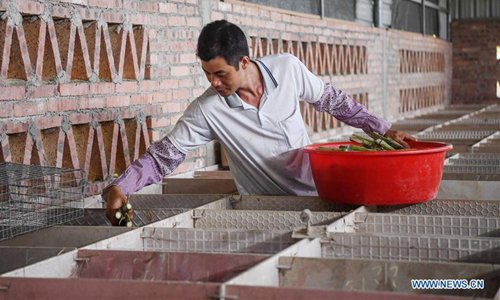HOME >> SOURCE
China's wildlife breeding industry suspended amid epidemic, local govts assist transition
By Song Lin Source:Global Times Published: 2020/3/23 21:33:40

Farmer Lin Jinghong feeds bamboo rats in Qinzhou City, south China's Guangxi Zhuang Autonomous Region, on July 24, 2019. The breeding of bamboo rats, which have high economic value, helps Lin's family get out of poverty. Lin's annual income has reached 100,000 yuan (14,552 U.S. dollars) in recent years. (Xinhua/Zhang Ailin)
The wildlife breeding industry is under mounting pressure as related trading has been comprehensively suspended in China amid the coronavirus outbreak. Farmers are facing fateful decisions under one widespread argument that the virus might have originated in wildlife species, and some farmers have decisively transferred to other industries with assistance from local governments.
"All trading of our products has been halted since the outbreak," said a farmer surnamed Li from Heyuan, Southern China's Guangdong Province who owns a bamboo rat breeding farm.
There are many different types of wildlife breeding farms in China, especially in South China's Guangdong Province and Guangxi Zhuang Autonomous Region, including both professional farms and local farmers raising small amounts of different kinds of wildlife, such as bamboo rats, paguma larvata, snakes and others.
Li told the Global Times that the local government has been promoting production transition under such critical circumstances, and offering help to poor farmers by transferring to new breeds, for instance, mushrooms, chickens or ducks.
Heyuan is one of the cities trying to alleviate the pressure off farmers beforehand and assisting them to initiate new activities as it's still unknown if certain types of wildlife breeding will be allowed to continue.
With measures including subsidies, low interest loans, donations and tailored supports, the anti-poverty office in Heyuan has found a way to further the government's anti-poverty campaign despite the epidemic, according to an online statement from the office.
There are 231 low-income households in Heyuan that are raising special wildlife species, with an annual output value of 6.83 million yuan ($960,000) in 2019, the domestic news site Yicai reported, citing data from the local government.
A total of 4,339 bamboo rats bred from 38 farmers will be transferred to projects cultivating mushrooms and raising chickens, and 1,249 porcupines will be replaced by fish and other poultries, the report said.
Meanwhile, medium and large scale farms are facing more complex situations, an owner of a farm in Guangxi raising 7,000-8,000 paguma larvata told the Global Times that he may lose over 10 million yuan in the next few months, and he has a newly completed plant which was intended to expand production.
"With huge initial investments and the new plants which are tailored for paguma larvata breeding, it is hard for me to transfer to other areas in the short term," he said.
"The sudden suspension has indeed brought great pressure to the sector, especially for those raised for food purposes…but it is also an opportunity to push the industry into a more healthier direction," Zhou Jinfeng, secretary-general of the China Biodiversity Conservation and Green Development Foundation, told the Global Times on Monday.
Local governments should enhance guidance and assistance to legal farmers and ban illegal operators. The improvement, though may take a long time, is conducive to the sustainable development of biodiversity protection and wildlife resources in China, and the coordinated development of ecological protection and poverty alleviation, Zhou said.
Also, it is worth to mention that special wildlife cultivation in China has various purposes, such as researching or maintaining diversity of species.
Zhou suggested that wildlife breeding could gradually transfer to a restoration of local livestock species, since traditional livestock breeds have been decreasing rapidly across the world. "It can help wildlife farmers to transfer production, and is conducive to the rapid recovery of China's agricultural biodiversity."
Posted in: INDUSTRIES,MARKETS